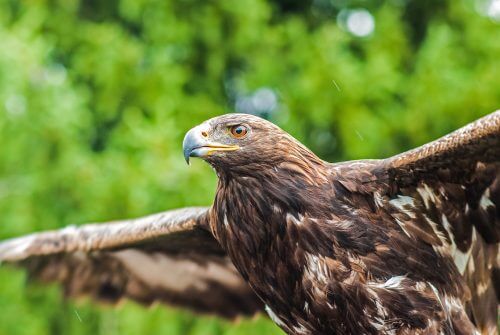A biomimetic camera inspired by the "super zoom" of birds of prey.

By: Dafna Haim-Langford
Researchers estimate that the vision of birds of prey is five times better than human vision. Tests have shown that an eagle can spot a rabbit from a distance of more than three kilometers, about the same as spotting an ant from a ten-story tower with the human eye.
Inspired by the vision of the eagle, researchers from the University of Stuttgart in Germany developed a miniaturized system of camera lenses that could give spy drones the ability to see like an eagle.
The development is based on foveated imaging technology where an object in the center of the field of view is captured with a significantly higher sharpness than the rest of the image. In the same way, seeing foveated vision gives an evolutionary advantage to birds of prey, they are aware of their surroundings by seeing the whole field, even if in a blurred way, but they see the prey with a very high sharpness.
Although traditional zoom lenses can also reach high resolution, this system has the advantage of miniaturization - the researchers are talking about lenses the size of a grain of salt. Another advantage is the ability to print the lenses on a 300D printer, thus reducing production costs significantly. Four tiny lenses were placed one on top of the other to create a kind of artificial eyeball that mimics the vision of birds of prey. This element, whose size does not exceed XNUMX microns, can be integrated into cameras, sensors in robots or drones. In addition to drones, the technology also has applications in the world of medicine and industry and wherever a tiny camera with high focusing capability is needed.

7 תגובות
To Tomer
Are you ready to implement your ("genius") proposal on your next child
When your wife is pregnant?
By the way, it is also possible, in the spirit of your suggestion, to transplant a segment into your and your wife's genome
the reproductive system of the hawk, then your wife will lay eggs, instead of conceiving, and you both can
Incubate in a row on the eggs. No more is better?
"An object in the center of the field of view is captured with a significantly higher definition than the rest of the image"
A figure that would be interesting to know is what is the angle of that high definition field of view center? Because if it is very narrow, then it is like looking for a small target in the landscape (for example a rabbit) through a drinking straw that is close to the eye, it is also not very effective, unless you have a lot of time to scan and a lot of patience.
There is no explanation in the whole article what is special about the eye of the raptors. And how do they focus at such a great distance. A camera that will focus on a rabbit at a distance of 5 kilometers should be quite large and certainly not the size of a hawk's eye.
It is worth mentioning that it is again
The source refers to an eagle and not a hawk
And like the difference between a rabbit and a rabbit, the difference is significant and important
Because despite the famous saying, the hawk hunts in densely wooded places
Therefore, his vision is indeed good, but for relatively short distances,
In contrast, most eagles (like falcons) hunt in open spaces
and recognizes its prey from a great height and therefore needs excellent vision
(like the one used for the camera),
Someone who writes about science and zoology
Must be precise.
collected... collected...
really…
Scarecrow Rabak
It doesn't really change the facts
It is also possible to transfer the DNA segment of the hawk's eye to a human
Then look as good as the hawk, with today's technology it can already be done.
deserves to be precise
Because in the original it is written: "they can spot a rabbit",
The translator wrote: "A hawk can recognize a rabbit",
The name rabbit in Hebrew is Arnbet (not a rabbit).